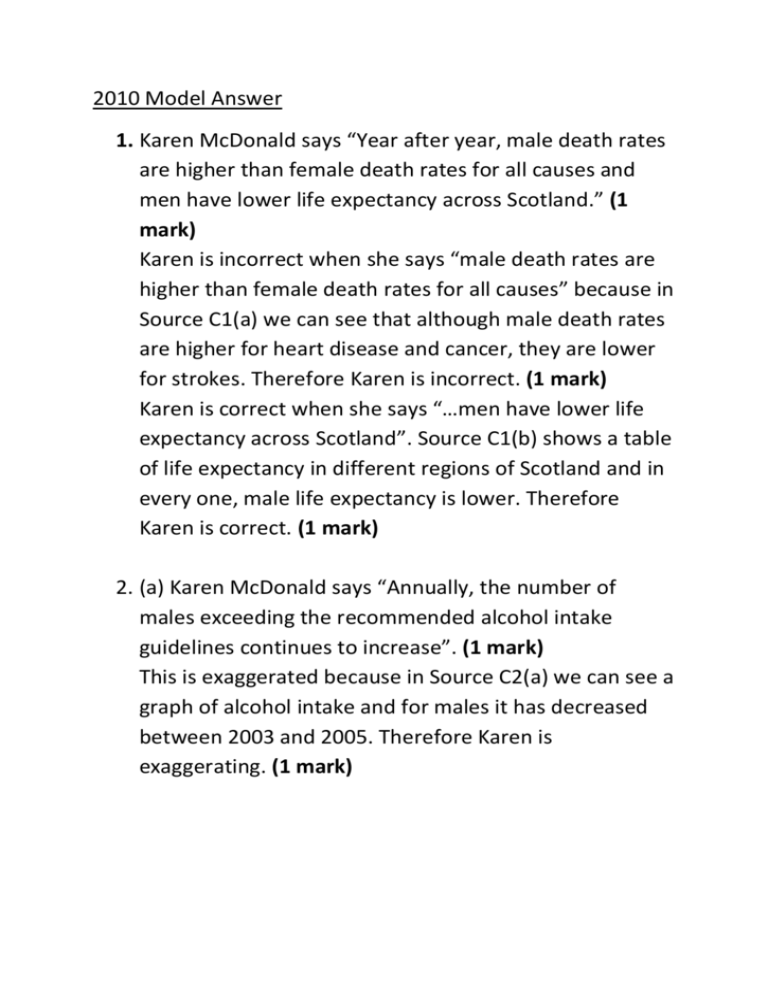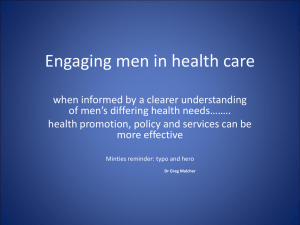Men have lower life expectancy than women
advertisement

2010 Model Answer 1. Karen McDonald says “Year after year, male death rates are higher than female death rates for all causes and men have lower life expectancy across Scotland.” (1 mark) Karen is incorrect when she says “male death rates are higher than female death rates for all causes” because in Source C1(a) we can see that although male death rates are higher for heart disease and cancer, they are lower for strokes. Therefore Karen is incorrect. (1 mark) Karen is correct when she says “…men have lower life expectancy across Scotland”. Source C1(b) shows a table of life expectancy in different regions of Scotland and in every one, male life expectancy is lower. Therefore Karen is correct. (1 mark) 2. (a) Karen McDonald says “Annually, the number of males exceeding the recommended alcohol intake guidelines continues to increase”. (1 mark) This is exaggerated because in Source C2(a) we can see a graph of alcohol intake and for males it has decreased between 2003 and 2005. Therefore Karen is exaggerating. (1 mark) 2. (b) William Walker says “In any event, more women now smoke than men in every age group”. (1 mark) This is exaggerated because in Source C2(b) we can see that men between the ages of 25-34 and 35-44 smoke more than women. (1 mark) 3. William Walker says “Surveys show most men wanted Well Man Clinics open in the evenings and a majority were unhappy with the information they received”. (1 mark) William is correct when he says “Surveys show most men wanted Well Man Clinics open in the evenings” as Source C3(b) shows that in a survey 77% of respondents said that they would like to have seen Well Man Clinics open in the evenings. (1 mark) William is incorrect when he says “…a majority were unhappy with the information they received” as Source C3(a) shows that in a survey, 85% of respondents said they were happy with the information they received. (1 mark) DME Report Role and Remit I am John Smith, a health policy adviser and have been asked to prepare a report for the SG Cabinet Secretary for Health and Wellbeing in which I will recommend whether or not to introduce Well Man Clinics to every part of Scotland. Recommendation Having given careful consideration to the evidence, I am recommending that Well Man Clinics should be introduced in every part of Scotland. Reasons for my recommendation 1. Men’s health continues to be worse than women’s (Source A) 2. Men have lower life expectancy than women (Source A/ Source C1(b) ) 3. Current Well Man Clinics have been successful (Source A/ Source C3(a) ) 4. Men are continuing to make poor lifestyle choices (Source A/ Source C2(b) ) Possible criticisms of my recommendation 1. Daytime Clinics are not convenient for all men (Source B) 2. The Clinics are a waste of money (Source B) Reasons for my recommendation 1. Men’s health continues to be worse than women’s It is clear that overall men’s health is worse than women’s and that the government needs to do something urgently to change this (Source A). Men have much higher death rates than women for illnesses such as heart disease and cancer and this needs to be addressed (Source C1(a) ). In addition, new legislation in relation to equality means that it is essential that the gender gap between the health of men and women be reduced and so it is important that initiatives are launched to achieve this (Source A). Furthermore, the “Macho” culture which is evident across Scotland, particularly in cities such as Glasgow, means that men do not always seek help when they need it. Therefore it is hugely important that men in Scotland be given more advice about the dangers of unhealthy lifestyles so that the gender gap in health can be reduced (BK, class notes). Therefore, I strongly recommend that Well Man clinics be introduced across Scotland. 2. Men have lower life expectancy than women Evidence clearly shows that women across Scotland live longer than men and it is crucial that this issue is tackled. In 2005, life expectancy for women in Scotland was 5 years longer than for men – 79.2 for women and 72.2 for men (Source C1(b) ). This is unacceptable and must be addressed. In cities in Scotland such as Glasgow and Edinburgh, too many men are shortening their own lives by making poor lifestyle choices and so it is crucial that something is done to counter this problem. Recent figures suggest that 20 Scots per week die as a result of alcohol related illnesses and most of these deaths are male (BK, BBC News Report). Therefore, it is of paramount importance that Well Man Clinics are introduced all over Scotland so that the gap in life expectancy between men and women can be reduced. 3. Current Well Man Clinics have been successful Another important reason why the Clinics should be introduced is because the existing Clinics have been popular. The pilot schemes introduced so far have worked well (Source A) and a recent survey of men involved found that 85% were happy with the information they received (Source C3(a) ). Therefore, since the pilot Clinics have been successful there is no reason why they should not be introduced throughout Scotland. 4. Men are continuing to make poor lifestyle choices Many men are continuing to make poor lifestyle choices and are more likely to drink, smoke, eat poorly and exercise less compared to women (Source A). From 1999 to 2005, men have consistently been more likely to drink too much compared to women (Source C2(a) ) and men aged 25-44 are more likely to smoke compared to women (Source C2(b) ). In 2008, the WHO Report on health in Scotland showed that the Calton area of Glasgow had an average male life expectancy of 54, and this was a result of high levels of smoking, drinking and other poor lifestyle choices (BK, class notes). Since the Well Man Clinics will offer advice on such issues and allow men to drop-in when it is convenient, they should be expanded across Scotland and this will help to reduce the number of men making poor lifestyle choices by making them more aware of the dangers. Possible criticisms/response to my critics 1. Daytime clinics are not convenient for all men It could be argued that the time of the clinics may not be suitable for many men. One study into the pilot schemes suggests that it is wrong to assume that “one size fits all” and that most men would rather have Clinics in the evenings (Source B). Indeed, one survey suggests that 77% would like to have Clinics available in the evenings (Source C3(b) ). However, there is no reason why health boards in Scotland could not make arrangements for this. Other drop in Clinics are available in the evenings for people to attend (BK, class notes) and so there is no good reason why evening Clinics would not be available. Also, the Well Man clinics are not intended to be a single solution to men’s health problems but rather can combine with other approaches to make a real difference. For example, government advertising campaigns emphasise the dangers of unhealthy lifestyle choices and the recet Minimum Pricing of Alcohol legislation are also making inroads into improving men’s health (BK, class notes). Therefore, whilst the Well Man Clinics may not be perfect they are a valuable method in attacking the problems with men’s health and will work well in addition to other government approaches. I therefore advise strongly that you see that these Clinics are opened across Scotland. 2. The Clinics are a waste of money There have been some suggestions that success with the existing Clinics has not been universal and that this means that the £4 million spent has been a waste (Source B). Critics have suggested that in a time of economic recession money should be invested on more successful projects such as previous programmes related to illegal drugs (Source B). However, it is clear that “prevention is better than cure” (Source A) and that if men get good advice before a problem gets out of hand then this will save the NHS money in the long run (Source A). The Well Man Clinics are popular and cost effective in comparison to other unpopular and expensive initiatives such as the distribution of Methadone to drug addicts (BK, class notes). Therefore, I would urge you to roll out these Clinics throughout Scotland as they are a cost effective way of preventing men from making poor lifestyle choices. Conclusion To conclude, I strongly urge you as the Scottish Government Cabinet Secretary for Health and Wellbeing to take into consideration the advice I have offered, particularly as regards the unacceptable gaps in health and life expectancy between men and women, the success of pilot Clinics and the continuing trend of poor male lifestyle choices. By introducing Well Man Clinics throughout Scotland, men’s health can be improved drastically. Yours sincerely John Smith





